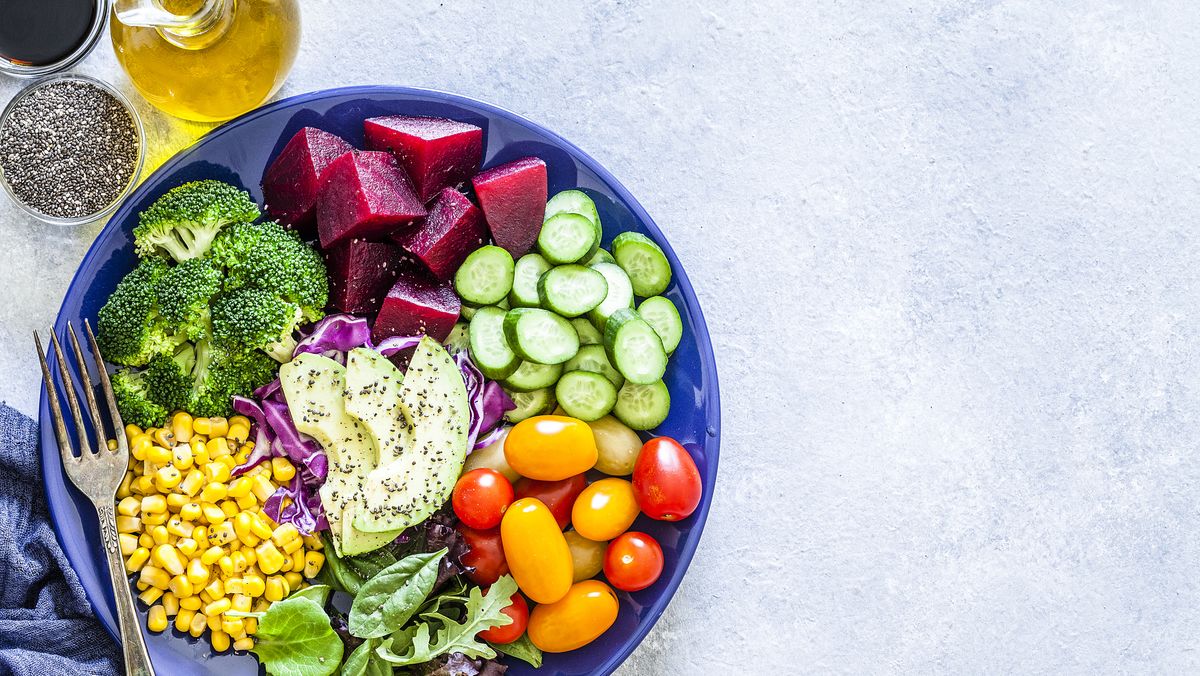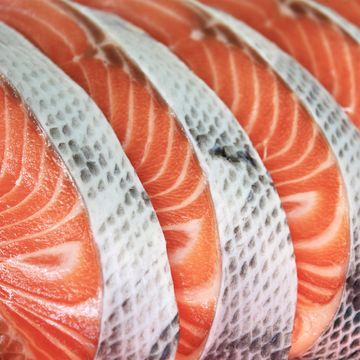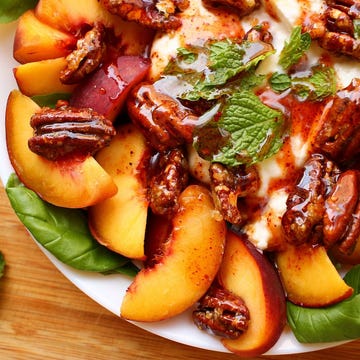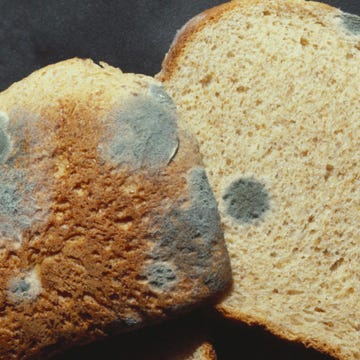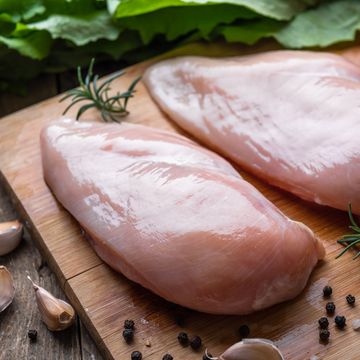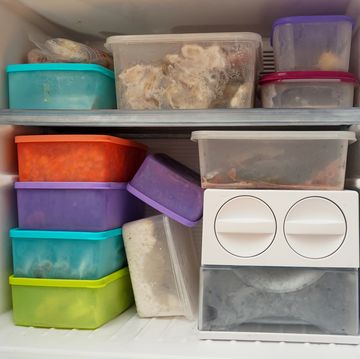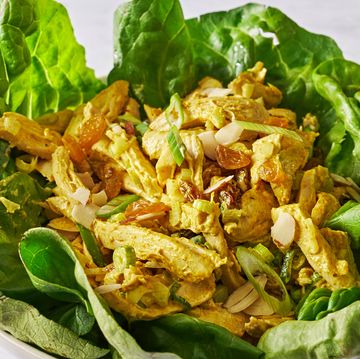You may not be able to jet off to Italy or Greece on a lark, but you can always channel the delicious vibes of the region by following the Mediterranean diet, an eating plan inspired by these countries. Not sure how to start a Mediterranean diet? Here's a detailed guide with all the steps you need.
First off, let's be clear: The Mediterranean diet is really about a lifestyle that emphasizes fruits, veggies, whole grains, seafood, and healthy fats. It's about making better choices in nutrition, which makes it sustainable for the long haul.
"The Mediterranean diet does not involve counting calories, tracking macronutrients, or any of the strict restrictions or rules of many fad diets marketed to us as quick fixes,” says nutritionist Lauren Armstrong, RDN.
Consistently ranked as one of the top eating styles year after year by U.S. News and World Report, the Mediterranean diet offers a variety of health benefits. That's why we put together an exclusive Mediterranean diet PDF guidebook just for WH+ members.
“This way of eating focuses heavily on a variety of nutrients, such as healthy fats, omega-3s, fiber, antioxidants, and phytonutrients, which are all associated with improved health and reduced disease,” Morgan Goodstadt, RD, the founder of Good Nutrition, previously told Women’s Health.
Meet the experts: Lauren Armstrong, RDN, is a nutritionist and medical editor at Havas Life Chicago. Morgan Goodstadt, RD, is a nutritionist and the founder of Good Nutrition.
While following this plan won't magically transport you to a villa somewhere in Greece (wouldn't that be nice), it can certainly put you in the right headspace. Research has shown that following a Mediterranean diet aligns with reduced rates of cancer, better heart health, and improved mental health.
If that all sounds good to you, keep reading for all the details on how to start the Mediterranean diet.
Try The Mediterranean Diet Now
What is the Mediterranean diet?
The Mediterranean diet refers to the eating habits of people who live in countries that border the Mediterranean Sea. This includes places such as France, Greece, Morocco, Turkey, Italy, and Spain. And while it has many benefits, including weight loss (per The American Journal of Medicine), there are few things you should know before you make the commitment.
If you're someone that's always on the go, consider making small lifestyle changes to ensure you're sticking to the right foods and not grabbing the easiest thing in reach.
Learn More About The Mediterranean Diet
“The premise is avoiding over-processed, packaged foods and enjoying fresh, whole foods whenever possible,” explains Emily Kyle, RDN. That means you'll want to leave out sodas, processed meats (like hot dogs), white bread, and candy.
How to get started on the Mediterranean diet
It might seem overwhelming to start a diet based on a culture that you might not be a part of or geographically near. Luckily, there are a few tips you can follow to ensure a smooth transition to a Mediterranean diet.
- Try incorporating seafood into your meals once a week.
- Keep healthy, fulfilling snacks on deck.
- Start using olive oil to cook.
- Don't shy away from frozen foods.
You'll find even more tips in our Mediterranean diet guide, exclusive to WH+ members.
What foods are considered a part of a Mediterranean diet?
Many different foods fit into a Mediterranean diet. And as you stock your fridge with these items more frequently, it will start to become second nature. Here's a general idea of what you'll be adding to your shopping cart.
- spinach
- potatoes
- beans
- salmon
- milk
- oats
- olives
- peaches
- hummus
- dark chocolate
- berries
- almonds
For a full shopping list, access our Mediterranean diet guidebook now.
The Dos and Don'ts of the Mediterranean diet
Here are some good general rules to follow if you're just getting started on this eating plan.
Dos:
- Choose a variety of fruits and vegetables. Consuming many different plants will ensure you also get all the essential nutrients you need, including fibers, minerals, and vitamins, says Goodstadt. This can help you fulfill your nutritional needs and feed the good bacteria in your gut, per a 2021 multicenter study published in Clinical Nutrition.
- Go ahead and spice your food up. An important element of the Mediterranean diet is the generous use of herbs, olive oil, and spices to make the food even more delicious, notes Goodstadt. “Herbs and spices are incredibly potent sources of anti-inflammatory antioxidants, so they will add some great flavor and health benefits,” she says. Think: basil, cilantro, cinnamon, ginger, oregano, parsley, rosemary, and turmeric.
- Fill your plate with 50 percent vegetables. Fruits and veggies are recommended at every meal, according to a 2015 review published in the journal Nutrients. “Most Americans are not meeting their daily need for fiber or veggies,” says Goodstadt. “Aiming to load about half of your plate with veggies will help ensure we are getting plenty of fiber and phytonutrients while also filling you up.”
- Incorporate whole grains and starchy vegetables. Whole grains provide fiber, minerals, protein, and minerals, while starchy vegetables are a great source of complex carbs and phytonutrients, per Goodstadt. They are important for energy, hormone balance, thyroid health, and satiety, according to a 2017 study published in the journal Nutrients. The Mediterranean diet technically recommends consuming these foods at every meal. Goodstadt also suggests balancing these types of carbs with healthy fats, proteins, and other veggies to maintain balanced blood sugar levels.
- Opt for high-quality protein sources. The Mediterranean diet emphasizes omega-3-rich fish, lean protein like poultry a few times, and eggs. Small amounts of red meat is okay. Goodstadt recommends opting for grass-fed, organic, pasture-raised, and wild versions of meat sources to ensure a better nutrient profile and a higher ratio of healthy fats.
Don’ts:
- Don’t consume tons of sugar or sugary beverages. “At first, cutting the sugar and sodas might be tough, but it will have incredible benefits on your health,” says Goodstadt. The primary source of sugar in the Mediterranean diet is fruits, which are packed with fiber and phytonutrients.
- Don’t eat a lot of high-mercury fish. While eating fish is a key component of the Mediterranean diet, some fish can be high in mercury and microplastics. For this reason, Goodstadt recommends choosing fish like anchovies, black sea bass, sardines, shellfish, sole, and wild-caught salmon. If you like tuna, look for light tuna or skipjack, which are lower in mercury.
- Don’t pressure yourself to be perfect. The Mediterranean diet is about developing a sustainable pattern of eating. If you're having trouble integrating healthy eating patterns into your life, consider working with a nutritionist for some extra support.
- Don’t rely on packaged foods. Ideally, you want to stick to minimally processed or whole foods. If you're looking for wholesome snack options that work with the Mediterranean Diet, reach for any of these foods when you feel the munchies coming on: full-fat greek yogurt with fruit, hard-boiled eggs, hummus, nuts, raw veggies, and trail mix.
- Don’t skimp on olive oil. Fat is incredibly important for brain health, energy, hormone production, and minimizing inflammation. Some of the most important elements of the Mediterranean diet are the abundance of healthy monounsaturated and omega-3 fats. Stick to oils that are cold-pressed (read: less inflammatory). Some good options include avocado, coconut, and olive.
You won't get bored with your meals.
Many assume that the Mediterranean diet means a restrictive or all seafood diet with a lack of variety. In reality, there are plenty of delicious meals you can add to your routine. Here's a sample seven-day meal plan that tastes amazing and is packed with nutrients.
Day 1
- Breakfast: Veggie frittata with tomatoes, spinach, mushrooms, and feta cheese
- Lunch: Quinoa and kale salad with walnuts, chopped dates, and parmesan in maple dijon dressing
- Snacks: Apple slices with cashews
- Dinner: Lemon caper shrimp over rice with large arugula salad
Day 2
- Breakfast: Shakshuka made with a tomato and veggie base and eggs
- Lunch: Greek salad with grilled shrimp
- Snacks: Hummus with sliced bell peppers and carrots
- Dinner: Spinach and feta turkey burgers with roasted sweet potatoes and broccoli
Day 3
- Breakfast: Plain Greek yogurt with berries, flax seeds, and shaved almonds
- Lunch: Leftover turkey burger over large salad
- Snacks: Dates with almond butter drizzle and piece of dark chocolate
- Dinner: Harissa chickpea stew
Day 4
- Breakfast: Whole-grain toast with avocado, tomato, and poached egg
- Lunch: White bean and tuna salad on whole grain toast
- Snacks: Plain Greek yogurt with fruit
- Dinner: Bison bolognese over zoodles
Day 5
- Breakfast: Chia pudding topped with fresh berries, banana coins, and cinnamon
- Lunch: Watermelon, mint, and feta salad with chicken
- Snacks: Eggplant or tzatziki dip with sliced cucumbers
- Dinner: Herby salmon with rice and a side salad of spinach, tomato, avocado, and balsamic vinaigrette
Day 6
- Breakfast: Oatmeal bowl topped with chia and flax seeds, fresh berries, banana coins, and nut butter drizzle
- Lunch: Arugula and lentil salad with shallots, tomatoes, and toasted almonds with leftover salmon
- Snacks: Hard boiled egg and serving of grapes
- Dinner: Chicken avgolemono soup with a side salad
Day 7
- Breakfast: Green smoothie made with spinach, kale, banana, pineapple, hemp seeds, and almond milk
- Lunch: Leftover soup with a Greek salad and slice of whole-grain toast
- Snacks: Homemade trail mix with almonds, cashews, pistachios, and dark chocolate chips
- Dinner: Seared scallops with parmesan roasted asparagus and quinoa
Need more inspo? We asked a nutritionist to map out even more ideas in our Mediterranean diet guidebook.
Try The Mediterranean Diet ASAP
Now that you've gotten a sneak peek of how to start a Mediterranean diet, it's time for you to dive into the real thing with this PDF guidebook that's an exclusive perk for our Women's Health+ members.
And BTW, signing up for a Women's Health+ membership also gives you access to our newsletter, *unlimited site content*, a one-year print magazine subscription, and our full library of healthy living PDFs and guidebooks.
Join Women's Health+ today for exclusive access to your Mediterranean diet PDF guide and tons more perks.
Sabrina is an editorial assistant for Women’s Health. When she’s not writing, you can find her running, training in mixed martial arts, or reading.
Ashley Martens is a Wellness Writer based in Chicago, Illinois. With a digital marketing background and her knowledge of general nutrition and a lifelong passion for all things health and wellness, Ashley covers topics that can help people live happier and healthier lives.
